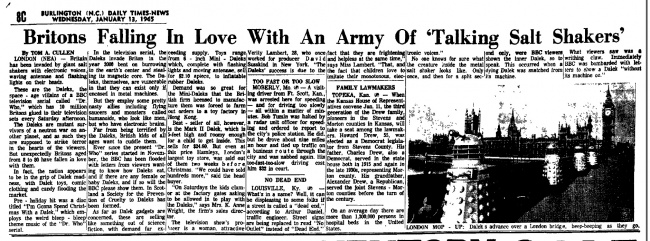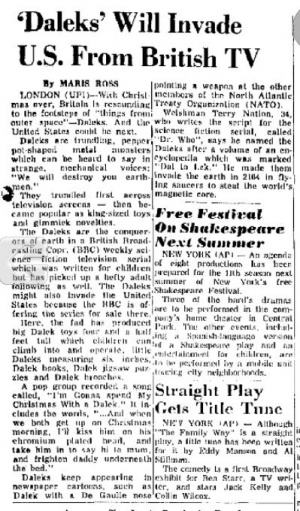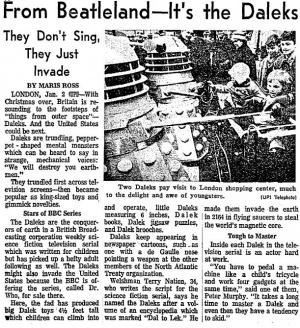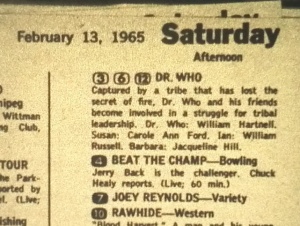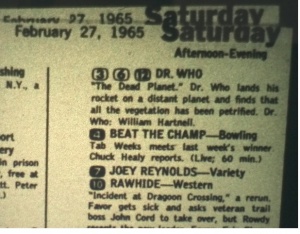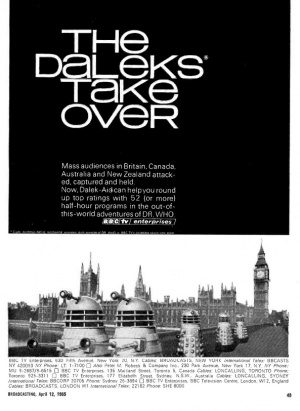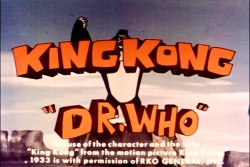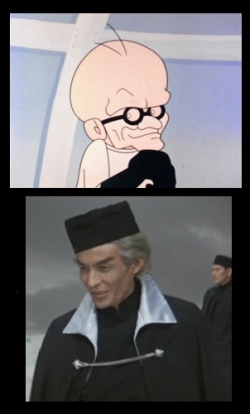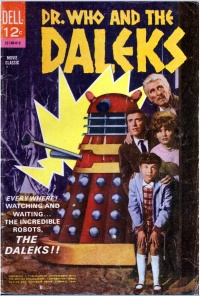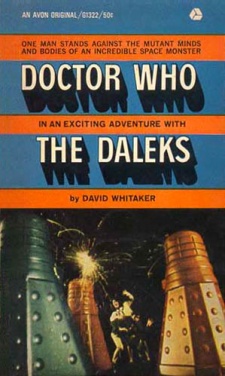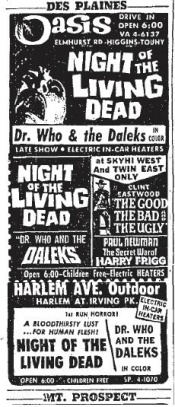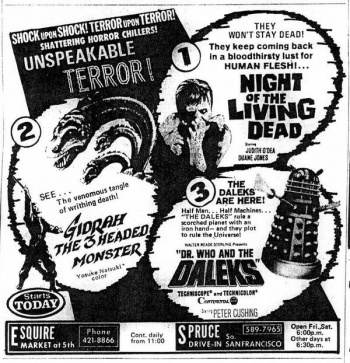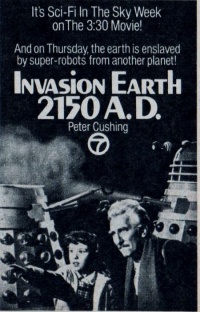Difference between revisions of "United States--1965-1969"
From BroaDWcast
Jump to navigationJump to searchJon Preddle (talk | contribs) |
Jon Preddle (talk | contribs) |
||
| (17 intermediate revisions by 2 users not shown) | |||
| Line 15: | Line 15: | ||
==1964== | ==1964== | ||
[[File:DalekSaltShakers.jpg|right|thumb|650px|"Talking Salt Shakers" -- Daleks phenomena sweeps Britain...]] | [[File:DalekSaltShakers.jpg|right|thumb|650px|"Talking Salt Shakers" -- Daleks phenomena sweeps Britain...]] | ||
| − | *'''November / December / January 1965''': Several newspapers across the country feature a syndicated report from London correspondent Tom A. Cullen, about the British invasion by '''"Talking Salt Shakers"''' -- the Daleks. The piece is illustrated with a publicity shot of the Daleks on Westminster bridge, taken during the filming of [[The Dalek Invasion of Earth]]. | + | *'''November / December 1964 / January 1965''': Several newspapers across the country feature a syndicated report from London correspondent Tom A. Cullen, about the British invasion by '''"Talking Salt Shakers"''' -- the Daleks. The piece is illustrated with a publicity shot of the Daleks on Westminster bridge, taken during the filming of [[The Dalek Invasion of Earth]]. |
{{clear}} | {{clear}} | ||
| Line 45: | Line 45: | ||
*'''12 April 1965''': That week's issue of US TV industry journal ''Broadcasting'' magazine carries a full page ad, declaring that '''"The Daleks Take Over''', [with] Mass audiences in Britain, [[Canada]], [[Australia]] and [[New Zealand]] ... Dalek-Aid can help you round up top ratings with '''52 (or more)''' half-hour programs in the out-of-this-world adventures of DR WHO". This is one of (if not ''the'') first promotional print ads for the series we have located in a US publication. At the time the BBC was actively marketing the first '''53 episodes''', [[An Unearthly Child]] to [[The Rescue]]. | *'''12 April 1965''': That week's issue of US TV industry journal ''Broadcasting'' magazine carries a full page ad, declaring that '''"The Daleks Take Over''', [with] Mass audiences in Britain, [[Canada]], [[Australia]] and [[New Zealand]] ... Dalek-Aid can help you round up top ratings with '''52 (or more)''' half-hour programs in the out-of-this-world adventures of DR WHO". This is one of (if not ''the'') first promotional print ads for the series we have located in a US publication. At the time the BBC was actively marketing the first '''53 episodes''', [[An Unearthly Child]] to [[The Rescue]]. | ||
*The very same ad appeared in ''Variety'' two days later. | *The very same ad appeared in ''Variety'' two days later. | ||
| − | * One of the first US stations to audition and consider buying the series is [[WFLD]] Channel 32 in Chicago. Program Director Cliff Braun screened the series in 1965 (or it may have been in 1966). He was rather keen, but for reasons unknown a sale did not eventuate. | + | *The BBC's distributor in the US at this time was '''Peter M Robeck & Company, Inc''' (incorporated in 1958). Based in New York, the distributor became '''Time-Life Films Inc''' in December 1969. (Time-Life would go on to distribute through the US the [[Jon Pertwee stories|Jon Pertwee]] and [[Tom Baker stories]] in the 1970s.) |
| + | * One of the first US stations to audition and consider buying the series is [[WFLD]] Channel 32 in Chicago. Program Director Cliff Braun screened the series in 1965 (or it may have been in 1966). He was rather keen, but for reasons unknown a sale did not eventuate. (This offer would have been made with the participation of Peter M Robeck & Company Inc.) | ||
* '''7 July 1965''': In a BBC memo dated 7 July 1965, "U.S.A" is listed as one of several countries to which a package of stories from seasons one and two (up to [[The Crusade]]) had been offered. This was no doubt in reference to the offer made to WFLD. | * '''7 July 1965''': In a BBC memo dated 7 July 1965, "U.S.A" is listed as one of several countries to which a package of stories from seasons one and two (up to [[The Crusade]]) had been offered. This was no doubt in reference to the offer made to WFLD. | ||
| − | ** A sale to the United States did not eventuate: in the 1960s, the BBC had found selling to the United States very | + | ** A sale to the United States did not eventuate: in the 1960s, the BBC had found selling to the United States very difficult because the National Association of Broadcasters ran a strict code of censorship and content guidelines for all US-made drama productions; these codes did not apply to imported programmes, and as such networks who relied upon advertisers and sponsors for their income were often wary of non-US programmes that contained material that could be considered controversial. (Some stations had sponsors that would often interfere and censor programmes at the scripting stage.) Also, the fact that it was an ongoing serial (other than soap operas, there were very few serials on US TV) and in black and white (by 1965/1966 the major networks were shifting to all-colour broadcasts), certainly would have also been key factors as to why the series didn't sell. |
***[http://cuttingsarchive.org/index.php/The_best_series_have_their_virtues Sydney Newman discusses why US wont buy UK serials; May 1968] | ***[http://cuttingsarchive.org/index.php/The_best_series_have_their_virtues Sydney Newman discusses why US wont buy UK serials; May 1968] | ||
| − | + | *Around this same time, Disney Studio's London office contacted the BBC about publishing a comic strip adaptation of the '''Doctor Who''' serial, [[Marco Polo]]. This did not go ahead. | |
| − | *Around this same time, Disney Studio's London office | ||
* '''December 1965''': ''Famous Monsters of Filmland'' issue #36 (cover dated December 1965) has a photograph showing "DR WHO as he appears in the British science-fiction TV series" - but it's not a photo of the Doctor, but one of the Menoptra from [[The Web Planet]]! | * '''December 1965''': ''Famous Monsters of Filmland'' issue #36 (cover dated December 1965) has a photograph showing "DR WHO as he appears in the British science-fiction TV series" - but it's not a photo of the Doctor, but one of the Menoptra from [[The Web Planet]]! | ||
**'''[http://cuttingsarchive.org/images/0/0f/1965-12_Famous_Monsters.jpg Dr Menoptra!]''' | **'''[http://cuttingsarchive.org/images/0/0f/1965-12_Famous_Monsters.jpg Dr Menoptra!]''' | ||
| Line 56: | Line 56: | ||
==1966== | ==1966== | ||
| + | [[File:KKDrWhoC.jpg|thumb|right|250px]] | ||
| + | [[File:KKDrWho.jpg|thumb|right|250px|The villains - Dr Who from the "King Kong" cartoon, and the very Hartnell-esque Eisei Amamoto from King Kong Escapes]] | ||
*From late 1965 and throughout 1966, the US/Japanese animated Saturday morning show '''"[[wikipedia:The King Kong Show|King Kong / The King Kong Show]]"''' went into production. (The first episodes went on air in the US from September 1966 and ran until August 1969.) A recurring villain of the animated series was the mad scientist "Dr Who". (Did the producers come up with the name themselves, or had they "borrowed" it having seen some of the promotional material that had by then been published about the BBC's series?) | *From late 1965 and throughout 1966, the US/Japanese animated Saturday morning show '''"[[wikipedia:The King Kong Show|King Kong / The King Kong Show]]"''' went into production. (The first episodes went on air in the US from September 1966 and ran until August 1969.) A recurring villain of the animated series was the mad scientist "Dr Who". (Did the producers come up with the name themselves, or had they "borrowed" it having seen some of the promotional material that had by then been published about the BBC's series?) | ||
*The script for a live action version of the cartoon series had also been written, but was replaced by a different idea, which became '''"[[wikipedia:King Kong Escapes|Kingu Kongu no Gyakushū / King Kong Escapes]]"''', a Japanese/American co-production from Toho and Rankin/Bass, released in [[Japan]] in July 1967 and the US in June 1968. As in the cartoon, the lead villain was named "Dr Who" (played by Eisei Amamoto) who wore a costume that did in fact have a very close similarity to that worn by William Hartnell! (Again, coincidence, or was the idea "borrowed" from the BBC series?) | *The script for a live action version of the cartoon series had also been written, but was replaced by a different idea, which became '''"[[wikipedia:King Kong Escapes|Kingu Kongu no Gyakushū / King Kong Escapes]]"''', a Japanese/American co-production from Toho and Rankin/Bass, released in [[Japan]] in July 1967 and the US in June 1968. As in the cartoon, the lead villain was named "Dr Who" (played by Eisei Amamoto) who wore a costume that did in fact have a very close similarity to that worn by William Hartnell! (Again, coincidence, or was the idea "borrowed" from the BBC series?) | ||
| Line 65: | Line 67: | ||
**[http://mondoexploito.com/?p=4548 Mechani-Kong] | **[http://mondoexploito.com/?p=4548 Mechani-Kong] | ||
{{Blank lines|3}} | {{Blank lines|3}} | ||
| − | + | {{clear}} | |
='''[[Peter Cushing|PETER CUSHING]] (DR. WHO)'''= | ='''[[Peter Cushing|PETER CUSHING]] (DR. WHO)'''= | ||
[[File:DelDaleks.jpg|thumb|right|200px|Dell comics adaptation of the first movie]] | [[File:DelDaleks.jpg|thumb|right|200px|Dell comics adaptation of the first movie]] | ||
* The first of the [[Peter Cushing]] Dalek movies is released in the UK. Several US magazines carry reviews: | * The first of the [[Peter Cushing]] Dalek movies is released in the UK. Several US magazines carry reviews: | ||
| − | ** '''7 July 1965''': ''Variety'' magazine publishes a review (from the UK | + | ** '''7 July 1965''': ''Variety'' magazine publishes a review (from the UK premiere) of '''Dr Who and the Daleks'''. |
| − | ** '''10 August 1966''': ''Variety'' magazine publishes a review (from the UK | + | ** '''10 August 1966''': ''Variety'' magazine publishes a review (from the UK premiere) of '''Daleks Invade the Earth 2150AD''' (sic). |
* '''April 1966''': ''Famous Monsters of Filmland'' issue #38 (cover date April 1966) carries the feature "THE DALEKS INVADE ENGLAND!", which gives a brief overview of the series, and a report from the set of [[The Web Planet]]. | * '''April 1966''': ''Famous Monsters of Filmland'' issue #38 (cover date April 1966) carries the feature "THE DALEKS INVADE ENGLAND!", which gives a brief overview of the series, and a report from the set of [[The Web Planet]]. | ||
**'''[https://docs.google.com/viewer?url=http://cuttingsarchive.org/images/c/c2/1976-10_Famous_Monsters.pdf DALEKS INVADE ENGLAND (FMoF 1976 Reprint)]''' | **'''[https://docs.google.com/viewer?url=http://cuttingsarchive.org/images/c/c2/1976-10_Famous_Monsters.pdf DALEKS INVADE ENGLAND (FMoF 1976 Reprint)]''' | ||
| − | * ''' | + | * '''11 May 1966''': '''Dr Who and the Daleks''' is released on US screens, distributed by the Continental Group. |
* '''1966-1967''': During the second half of 1966 and all of 1967, Terry Nation attempts to sell the concept of a Dalek spin-off series to American networks. The series never goes ahead, but a contractual condition during this period of negotiation is that the BBC can no longer sell Dalek stories to overseas broadcasters... | * '''1966-1967''': During the second half of 1966 and all of 1967, Terry Nation attempts to sell the concept of a Dalek spin-off series to American networks. The series never goes ahead, but a contractual condition during this period of negotiation is that the BBC can no longer sell Dalek stories to overseas broadcasters... | ||
* '''November 1966''': Dell Publishing Co Inc releases a comic adaptation of the first Dalek movie. It retails for 12c. | * '''November 1966''': Dell Publishing Co Inc releases a comic adaptation of the first Dalek movie. It retails for 12c. | ||
| + | |||
| + | *Due to poor box-office of the first, the second Cushing film, '''"Daleks Invasion Earth 2150 AD"''' never receives a theatrical release in the US. It makes its screen debut on television in 1969... | ||
| Line 97: | Line 101: | ||
*'''19 June 1968''': '''"King Kong Escapes"''' (see above) is released in the States. | *'''19 June 1968''': '''"King Kong Escapes"''' (see above) is released in the States. | ||
* '''October/December 1968''': '''Dr Who and the Daleks''' is re-released in selected theatres (such as in [[Chicago]] and [[San Francisco]]), on a double bill with the debut release of George Romero's '''[[wikipedia: Night of the Living Dead|Night of the Living Dead]]'''. | * '''October/December 1968''': '''Dr Who and the Daleks''' is re-released in selected theatres (such as in [[Chicago]] and [[San Francisco]]), on a double bill with the debut release of George Romero's '''[[wikipedia: Night of the Living Dead|Night of the Living Dead]]'''. | ||
| + | |||
| + | [[File:2150ADUSA.JPG|right|thumb|200px|Listing for second Dalek movie in Los Angeles, 8 January 1976]] | ||
==1969== | ==1969== | ||
| − | *'''April 1969''': '''Dr Who and the Daleks''' airs on [[WFLD]] Channel 32 in [[Chicago]] | + | *At the beginning of the year, the two [[Peter Cushing]] Dalek movies begin to appear on network and independent television stations. The second film never had a theatrical release in the USA; it is billed under the shortened title '''"Invasion Earth 2150 AD"''' in print listings -- i.e. the word "Dalek" is omitted. |
| + | *'''April 1969''': '''Dr Who and the Daleks''' airs on [[WFLD]] Channel 32 in [[Chicago]] - the very same station that had looked at buying '''Doctor Who''' back in 1965! | ||
Latest revision as of 19:52, 22 November 2021
United States--1963-1969
| United States Chronology | |
| 1963-1969 | 1971-1972 | 1973-1977 | 1978 | 1979 | 1980 | 1981 | 1982 | 1983 | 1984 | 1985 | 1986 | 1987 | 1988 | 1989 | 1990 | 1991-2020s | |
| Related articles | List of conventions | List of fan clubs | References to the USA in Doctor Who | Doctor Who USA Tour | USA Tour stops | Documentaries and specials | TV Guide | Saturday, March 12, 1988 | First airings by episode | Search by episode title or date | United States by the numbers | Chicago chronology | Time-Life Television |
Having already successfully sold Doctor Who to several countries around the world by late 1964, the BBC turned its attention to the United States of America. But finalising a sale to the USA would take several years...
1963
- On 4 December 1963, the US industry magazine Variety publishes a review -- written by British journalist Robert Ottaway (credited as just Otta) -- of An Unearthly Child, which had recently been broadcast on BBC TV.
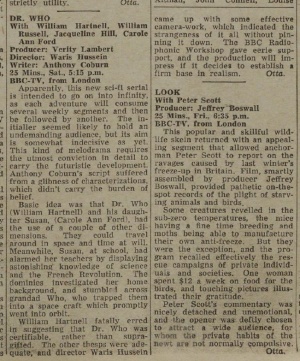 Variety reviews An Unearthly Child, Dec. 4, 1963 |
1964
- November / December 1964 / January 1965: Several newspapers across the country feature a syndicated report from London correspondent Tom A. Cullen, about the British invasion by "Talking Salt Shakers" -- the Daleks. The piece is illustrated with a publicity shot of the Daleks on Westminster bridge, taken during the filming of The Dalek Invasion of Earth.
1965
- During January and February 1965, several US newspapers carry sound bites from an article written by Maris Ross, first published in the British press (and syndicated to the US by the United Press International (UPI)), reporting on the new sensation Dalekmania that was sweeping the UK following the recently-completed screening of The Dalek Invasion of Earth. The article states that "With Christmas over, Britain is resounding to the footsteps of "things from outer space" – Daleks. And the United States could be next ... The Daleks might also invade the United States because the BBC is offering the series, called Dr. Who, for sale there".
- For the series to have been under consideration by January 1965, the BBC's offer must have been made in late 1964, which was also when New Zealand and Canada were both auditioning the new series... The BBC's sales office in New York would have handled all sales promotions and contracts.
- 23 January 1965 to 2 July 1965: Viewers in states along the border with Canada and who could pick up transmissions from the CBC stations would have been able to see broadcasts of the first five William Hartnell stories.
- The Lake Ontario edition of the US TV Guide for those dates contains billings for Ontario-based CBC stations CKVR (channel 3), CBLT (channel 6) and CHEX (channel 12):
- 12 April 1965: That week's issue of US TV industry journal Broadcasting magazine carries a full page ad, declaring that "The Daleks Take Over, [with] Mass audiences in Britain, Canada, Australia and New Zealand ... Dalek-Aid can help you round up top ratings with 52 (or more) half-hour programs in the out-of-this-world adventures of DR WHO". This is one of (if not the) first promotional print ads for the series we have located in a US publication. At the time the BBC was actively marketing the first 53 episodes, An Unearthly Child to The Rescue.
- The very same ad appeared in Variety two days later.
- The BBC's distributor in the US at this time was Peter M Robeck & Company, Inc (incorporated in 1958). Based in New York, the distributor became Time-Life Films Inc in December 1969. (Time-Life would go on to distribute through the US the Jon Pertwee and Tom Baker stories in the 1970s.)
- One of the first US stations to audition and consider buying the series is WFLD Channel 32 in Chicago. Program Director Cliff Braun screened the series in 1965 (or it may have been in 1966). He was rather keen, but for reasons unknown a sale did not eventuate. (This offer would have been made with the participation of Peter M Robeck & Company Inc.)
- 7 July 1965: In a BBC memo dated 7 July 1965, "U.S.A" is listed as one of several countries to which a package of stories from seasons one and two (up to The Crusade) had been offered. This was no doubt in reference to the offer made to WFLD.
- A sale to the United States did not eventuate: in the 1960s, the BBC had found selling to the United States very difficult because the National Association of Broadcasters ran a strict code of censorship and content guidelines for all US-made drama productions; these codes did not apply to imported programmes, and as such networks who relied upon advertisers and sponsors for their income were often wary of non-US programmes that contained material that could be considered controversial. (Some stations had sponsors that would often interfere and censor programmes at the scripting stage.) Also, the fact that it was an ongoing serial (other than soap operas, there were very few serials on US TV) and in black and white (by 1965/1966 the major networks were shifting to all-colour broadcasts), certainly would have also been key factors as to why the series didn't sell.
- Around this same time, Disney Studio's London office contacted the BBC about publishing a comic strip adaptation of the Doctor Who serial, Marco Polo. This did not go ahead.
- December 1965: Famous Monsters of Filmland issue #36 (cover dated December 1965) has a photograph showing "DR WHO as he appears in the British science-fiction TV series" - but it's not a photo of the Doctor, but one of the Menoptra from The Web Planet!
1966
- From late 1965 and throughout 1966, the US/Japanese animated Saturday morning show "King Kong / The King Kong Show" went into production. (The first episodes went on air in the US from September 1966 and ran until August 1969.) A recurring villain of the animated series was the mad scientist "Dr Who". (Did the producers come up with the name themselves, or had they "borrowed" it having seen some of the promotional material that had by then been published about the BBC's series?)
- The script for a live action version of the cartoon series had also been written, but was replaced by a different idea, which became "Kingu Kongu no Gyakushū / King Kong Escapes", a Japanese/American co-production from Toho and Rankin/Bass, released in Japan in July 1967 and the US in June 1968. As in the cartoon, the lead villain was named "Dr Who" (played by Eisei Amamoto) who wore a costume that did in fact have a very close similarity to that worn by William Hartnell! (Again, coincidence, or was the idea "borrowed" from the BBC series?)
- For further reading about the animated show and movie, see:
PETER CUSHING (DR. WHO)
- The first of the Peter Cushing Dalek movies is released in the UK. Several US magazines carry reviews:
- 7 July 1965: Variety magazine publishes a review (from the UK premiere) of Dr Who and the Daleks.
- 10 August 1966: Variety magazine publishes a review (from the UK premiere) of Daleks Invade the Earth 2150AD (sic).
- April 1966: Famous Monsters of Filmland issue #38 (cover date April 1966) carries the feature "THE DALEKS INVADE ENGLAND!", which gives a brief overview of the series, and a report from the set of The Web Planet.
- 11 May 1966: Dr Who and the Daleks is released on US screens, distributed by the Continental Group.
- 1966-1967: During the second half of 1966 and all of 1967, Terry Nation attempts to sell the concept of a Dalek spin-off series to American networks. The series never goes ahead, but a contractual condition during this period of negotiation is that the BBC can no longer sell Dalek stories to overseas broadcasters...
- November 1966: Dell Publishing Co Inc releases a comic adaptation of the first Dalek movie. It retails for 12c.
- Due to poor box-office of the first, the second Cushing film, "Daleks Invasion Earth 2150 AD" never receives a theatrical release in the US. It makes its screen debut on television in 1969...
1967
- March 1967: Famous Monsters of Filmland #44 (cover date May 1967) carries the article "THE DALEKS ARE COMING!", which previews the first Dalek movie.
- July 1967: Avon books publishes a US edition of David Whitaker's novelisation, Doctor Who in an Exciting Adventure with the Daleks. It retails for 50c.
1968
- 19 June 1968: "King Kong Escapes" (see above) is released in the States.
- October/December 1968: Dr Who and the Daleks is re-released in selected theatres (such as in Chicago and San Francisco), on a double bill with the debut release of George Romero's Night of the Living Dead.
1969
- At the beginning of the year, the two Peter Cushing Dalek movies begin to appear on network and independent television stations. The second film never had a theatrical release in the USA; it is billed under the shortened title "Invasion Earth 2150 AD" in print listings -- i.e. the word "Dalek" is omitted.
- April 1969: Dr Who and the Daleks airs on WFLD Channel 32 in Chicago - the very same station that had looked at buying Doctor Who back in 1965!
| United States Chronology | |
| 1963-1969 | 1971-1972 | 1973-1977 | 1978 | 1979 | 1980 | 1981 | 1982 | 1983 | 1984 | 1985 | 1986 | 1987 | 1988 | 1989 | 1990 | 1991-2020s | |
| Related articles | List of conventions | List of fan clubs | References to the USA in Doctor Who | Doctor Who USA Tour | USA Tour stops | Documentaries and specials | TV Guide | Saturday, March 12, 1988 | First airings by episode | Search by episode title or date | United States by the numbers | Chicago chronology | Time-Life Television |
.
